
Java (481)
When it comes to PDF documents, stamps offer an indispensable feature for adding contextual information and visual elements. These stamps can range from simple notes to complex graphics, enabling users to annotate, emphasize, or personalize their PDF content. With the ability to place stamps strategically, businesses can streamline workflows, indicate approvals, or provide concise feedback.
In this article, you will learn how to programmatically add dynamic stamps and image stamps to a PDF document using Spire.PDF for Java.
Install Spire.PDF for Java
To start, make sure to add the Spire.Pdf.jar file as a dependency in your Java program. You can download Spire.PDF for Java from our website and manually import the JAR file into your application. If you are using Maven, simply add the following code to your project's pom.xml file to include the JAR file effortlessly.
<repositories>
<repository>
<id>com.e-iceblue</id>
<name>e-iceblue</name>
<url>https://repo.e-iceblue.com/nexus/content/groups/public/</url>
</repository>
</repositories>
<dependencies>
<dependency>
<groupId>e-iceblue</groupId>
<artifactId>spire.pdf</artifactId>
<version>11.12.16</version>
</dependency>
</dependencies>
Prior Knowledge
In PDF, a stamp refers to an annotation or graphical element that can be added to a document to provide additional information. Spire.PDF for Java introduces the PdfRubberStampAnnotation class, which serves as a representation of a rubber stamp. To create the visual representation of a rubber stamp, the PdfTemplate class is employed. This class acts as a canvas allowing you to draw various types of information, including text, images, shapes, and date/time elements.
Add a Dynamic Stamp to PDF in Java
A dynamic stamp refers to a customizable annotation that can be added to a PDF document to indicate a specific status, approval, or other information. Unlike static stamps, dynamic stamps contain variables or fields that can be dynamically updated, such as the current date, time, username, or any other custom data.
The following are the steps to add a dynamic stamp to PDF using Spire.PDF for Java.
- Create a PdfDocument object.
- Load a PDF file using PdfDocument.loadFromFile() method.
- Create a PdfTemplate object with desired size.
- Draw strings (including dynamic information such as date and time) on the template using PdfTemplate.getGraphics().drawString() method.
- Create a PdfRubberStampAnnotation object, and set the template as its appearance.
- Add the stamp to a specific PDF page using PdfPageBase.getAnnotationsWidget().add() method.
- Save the document to a different PDF file using PdfDocument.saveToFile() method.
- Java
import com.spire.pdf.PdfDocument;
import com.spire.pdf.PdfPageBase;
import com.spire.pdf.annotations.PdfRubberStampAnnotation;
import com.spire.pdf.annotations.appearance.PdfAppearance;
import com.spire.pdf.graphics.*;
import java.awt.*;
import java.awt.geom.Point2D;
import java.awt.geom.Rectangle2D;
import java.text.SimpleDateFormat;
public class AddDynamicStampToPdf {
public static void main(String[] args) {
// Create a PdfDocument object
PdfDocument document = new PdfDocument();
// Load a PDF file
document.loadFromFile("C:\\Users\\Administrator\\Desktop\\Input.pdf");
// Get the last page
PdfPageBase page = document.getPages().get(document.getPages().getCount() - 1);
// Create a PdfTemplate object
PdfTemplate template = new PdfTemplate(195, 50);
// Create two fonts
PdfTrueTypeFont font1 = new PdfTrueTypeFont(new Font("Elephant", Font.ITALIC, 15), true);
PdfTrueTypeFont font2 = new PdfTrueTypeFont(new Font("Arial", Font.ITALIC, 10), true);
// Create a solid brush and a gradient brush
PdfSolidBrush solidBrush = new PdfSolidBrush(new PdfRGBColor(Color.black));
Rectangle2D rect1 = new Rectangle2D.Float();
rect1.setFrame(new Point2D.Float(0, 0), template.getSize());
PdfLinearGradientBrush linearGradientBrush = new PdfLinearGradientBrush(rect1, new PdfRGBColor(Color.white), new PdfRGBColor(Color.orange), PdfLinearGradientMode.Horizontal);
// Create rounded rectangle path
int CornerRadius = 10;
PdfPath path = new PdfPath();
path.addArc(template.getBounds().getX(), template.getBounds().getY(), CornerRadius, CornerRadius, 180, 90);
path.addArc(template.getBounds().getX() + template.getWidth() - CornerRadius, template.getBounds().getY(), CornerRadius, CornerRadius, 270, 90);
path.addArc(template.getBounds().getX() + template.getWidth() - CornerRadius, template.getBounds().getY() + template.getHeight() - CornerRadius, CornerRadius, CornerRadius, 0, 90);
path.addArc(template.getBounds().getX(), template.getBounds().getY() + template.getHeight() - CornerRadius, CornerRadius, CornerRadius, 90, 90);
path.addLine(template.getBounds().getX(), template.getBounds().getY() + template.getHeight() - CornerRadius, template.getBounds().getX(), template.getBounds().getY() + CornerRadius / 2);
// Draw path on the template
template.getGraphics().drawPath(linearGradientBrush, path);
template.getGraphics().drawPath(PdfPens.getRed(), path);
// Draw dynamic text on the template
String s1 = "APPROVED\n";
String s2 = "By Manager at " + dateToString(new java.util.Date(), "yyyy-MM-dd HH:mm:ss");
template.getGraphics().drawString(s1, font1, solidBrush, new Point2D.Float(5, 5));
template.getGraphics().drawString(s2, font2, solidBrush, new Point2D.Float(2, 28));
// Create a rubber stamp, specifying its size and location
Rectangle2D rect2 = new Rectangle2D.Float();
rect2.setFrame(new Point2D.Float(50, (float) (page.getActualSize().getHeight() - 300)), template.getSize());
PdfRubberStampAnnotation stamp = new PdfRubberStampAnnotation(rect2);
// Create a PdfAppearance object and apply the template as its normal state
PdfAppearance appearance = new PdfAppearance(stamp);
appearance.setNormal(template);
// Apply the appearance to stamp
stamp.setAppearance(appearance);
// Add the stamp annotation to annotation collection
page.getAnnotationsWidget().add(stamp);
// Save the file
document.saveToFile("output/DynamicStamp.pdf");
document.close();
}
// Convert date to string
public static String dateToString(java.util.Date date, String dateFormat) {
SimpleDateFormat format = new SimpleDateFormat(dateFormat);
return format.format(date);
}
}
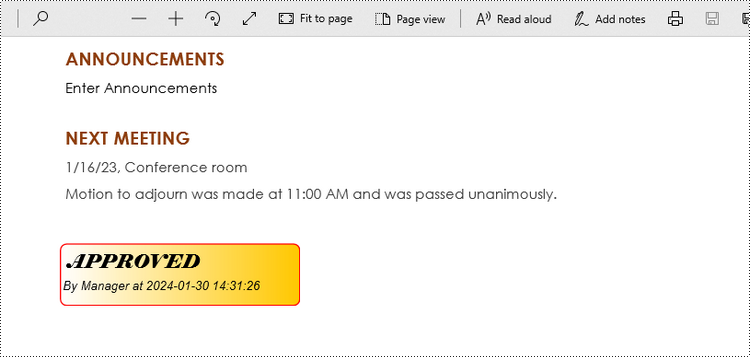
Add an Image Stamp to PDF in Java
An image stamp in PDF refers to a graphical element that is added to a document as an annotation or overlay. It involves placing an image onto a specific location within a PDF page.
The steps to add an image stamp to PDF using Spire.PDF for Java are as follows.
- Create a PdfDocument object.
- Load a PDF file using PdfDocument.loadFromFile() method.
- Load an image that you want to stamp on PDF using PdfImage.fromFile() method.
- Create a PdfTemplate object based on the size of the image.
- Draw the image on the template using PdfTemplate.getGraphics().drawImage() method.
- Create a PdfRubberStampAnnotation object, and set the template as its appearance.
- Add the stamp to a specific PDF page using PdfPageBase.getAnnotationsWidget().add() method.
- Save the document to a different PDF file using PdfDocument.saveToFile() method.
- Java
import com.spire.pdf.PdfDocument;
import com.spire.pdf.PdfPageBase;
import com.spire.pdf.annotations.PdfRubberStampAnnotation;
import com.spire.pdf.annotations.appearance.PdfAppearance;
import com.spire.pdf.graphics.PdfImage;
import com.spire.pdf.graphics.PdfTemplate;
import java.awt.geom.Rectangle2D;
public class AddImageStampToPdf {
public static void main(String[] args) {
// Create a PdfDocument object
PdfDocument document = new PdfDocument();
// Load a PDF document
document.loadFromFile("C:\\Users\\Administrator\\Desktop\\Input.pdf");
// Get the last page
PdfPageBase page = document.getPages().get(document.getPages().getCount() - 1);
// Load an image file
PdfImage image = PdfImage.fromFile("C:\\Users\\Administrator\\Desktop\\stamp-image.png");
// Get the width and height of the image
int width = image.getWidth();
int height = image.getHeight();
// Create a PdfTemplate object based on the size of the image
PdfTemplate template = new PdfTemplate(width, height);
// Draw image on the template
template.getGraphics().drawImage(image, 0, 0, width, height);
// Create a rubber stamp annotation, specifying its location and position
Rectangle2D rect = new Rectangle2D.Float((float) (page.getActualSize().getWidth() - width - 50), (float) (page.getActualSize().getHeight() - 400), width, height);
PdfRubberStampAnnotation stamp = new PdfRubberStampAnnotation(rect);
// Create a PdfAppearance object
PdfAppearance pdfAppearance = new PdfAppearance(stamp);
// Set the template as the normal state of the appearance
pdfAppearance.setNormal(template);
// Apply the appearance to the stamp
stamp.setAppearance(pdfAppearance);
// Add the stamp annotation to PDF
page.getAnnotationsWidget().add(stamp);
// Save the file
document.saveToFile("output/ImageStamp.pdf");
document.close();
}
}
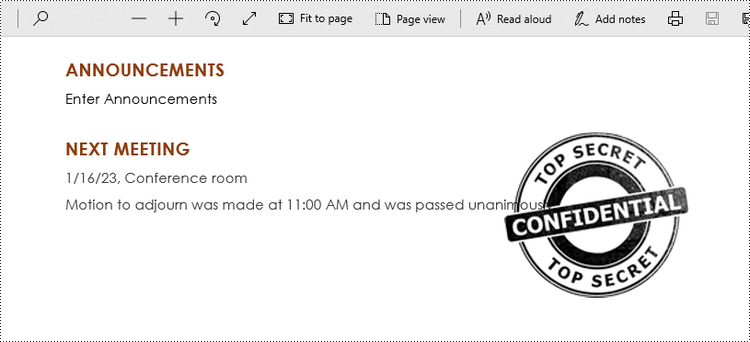
Apply for a Temporary License
If you'd like to remove the evaluation message from the generated documents, or to get rid of the function limitations, please request a 30-day trial license for yourself.
When drawing text on PDF page, you can align text horizontally and vertically. This tutorial will show you how to align text in a line and a rectangle by using Spire.PDF for Java.
Align Text in Line
import com.spire.pdf.graphics.*;
import java.awt.*;
public class AlignTextInLine {
public static void main(String[] args) {
//create a PdfDocument object
PdfDocument doc = new PdfDocument();
//add a page
PdfPageBase page = doc.getPages().add();
//create a true type font
PdfTrueTypeFont font= new PdfTrueTypeFont(new Font("Times New Roman",Font.PLAIN,15));
//create a brush
PdfSolidBrush brush = new PdfSolidBrush(new PdfRGBColor(Color.black));
//create a PdfStringFormat object, specifying PdfTextAlignment to Left
PdfStringFormat leftAlignment = new PdfStringFormat(PdfTextAlignment.Left);
//draw text at left
page.getCanvas().drawString("Left", font , brush, 0, 20, leftAlignment);
//draw text at right
PdfStringFormat rightAlignment = new PdfStringFormat(PdfTextAlignment.Right);
page.getCanvas().drawString("Right", font , brush, page.getCanvas().getClientSize().getWidth(), 20, rightAlignment);
//draw text in center
PdfStringFormat centerAlignment = new PdfStringFormat(PdfTextAlignment.Center);
page.getCanvas().drawString("Center", font , brush, page.getCanvas().getClientSize().getWidth() / 2, 20, centerAlignment);
//save the file
doc.saveToFile("AlignTextInLine.pdf");
}
}
Output:
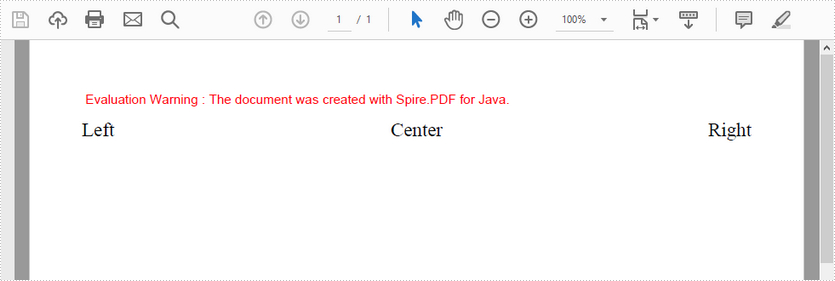
Align Text in Rectangle
import com.spire.pdf.graphics.*;
import java.awt.*;
import java.awt.geom.Rectangle2D;
public class AlignTextInRectangle {
public static void main(String[] args) {
//create a PdfDocument object
PdfDocument doc = new PdfDocument();
//add a page
PdfPageBase page = doc.getPages().add();
//create a true type font
PdfTrueTypeFont font= new PdfTrueTypeFont(new Font("Times New Roman",Font.PLAIN,15));
//craete a pen
PdfPen pen = new PdfPen(new PdfRGBColor(Color.black));
//create a brush
PdfSolidBrush brush = new PdfSolidBrush(new PdfRGBColor(Color.black));
//draw a rectangle
Rectangle2D.Float rect = new Rectangle2D.Float();
rect.setRect(0, 20, page.getCanvas().getClientSize().getWidth() / 2, 100);
page.getCanvas().drawRectangle(pen, rect);
//create a PdfStringFormat object, specifying PdfTextAlignment to Top and Left
PdfStringFormat topLeft = new PdfStringFormat(PdfTextAlignment.Left, PdfVerticalAlignment.Top);
//draw text at top left
page.getCanvas().drawString("TopLeft", font, brush, rect, topLeft);
//draw text at top right
PdfStringFormat topRight = new PdfStringFormat(PdfTextAlignment.Right, PdfVerticalAlignment.Top);
page.getCanvas().drawString("TopRight", font, brush, rect, topRight);
//draw text in center
PdfStringFormat center = new PdfStringFormat(PdfTextAlignment.Center, PdfVerticalAlignment.Middle);
page.getCanvas().drawString("Center", font, brush, rect, center);
//draw text at bottom left
PdfStringFormat bottomLeft = new PdfStringFormat(PdfTextAlignment.Left, PdfVerticalAlignment.Bottom);
page.getCanvas().drawString("BottomLeft", font, brush, rect, bottomLeft);
//draw text at bottom right
PdfStringFormat bottomRight = new PdfStringFormat(PdfTextAlignment.Right, PdfVerticalAlignment.Bottom);
page.getCanvas().drawString("BottomRight", font, brush, rect, bottomRight);
//save the file
doc.saveToFile("AlignTextInRectangle.pdf");
}
}
Output:
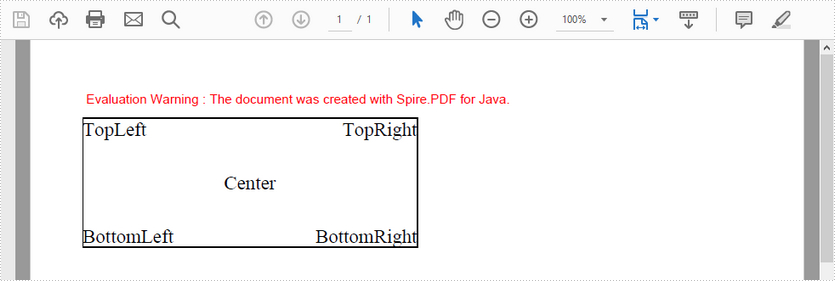
A table represents information or data in the form of horizontal rows and vertical columns. Creating tables is often more efficient than describing the data in the paragraph text, especially when the data is numerical or large. The tabular data presentation makes it easier to read and understand. In this article, you will learn how to create tables in a PDF document in Java using Spire.PDF for Java.
Spire.PDF for Java offers the PdfTable and the PdfGrid class to work with the tables in a PDF document. The PdfTable class is used to quickly create simple, regular tables without too much formatting, while the PdfGrid class is used to create more complex tables.
The table below lists the differences between these two classes.
| PdfTable | PdfGrid | |
| Formatting | ||
| Row | Can be set through events. No API support. | Can be set through API. |
| Column | Can be set through API. | Can be set through API. |
| Cell | Can be set through events. No API support. | Can be set through API. |
| Others | ||
| Column span | Not support. | Can be set through API. |
| Row span | Can be set through events. No API support. | Can be set through API. |
| Nested table | Can be set through events. No API support. | Can be set through API. |
| Events | BeginCellLayout, EndCellLayout, BeginRowLayout, EndRowLayout, BeginPageLayout, EndPageLayout. | BeginPageLayout, EndPageLayout. |
The following sections demonstrate how to create a table in PDF using the PdfTable class and the PdfGrid class, respectively.
Install Spire.PDF for Java
First of all, you're required to add the Spire.Pdf.jar file as a dependency in your Java program. The JAR file can be downloaded from this link. If you use Maven, you can easily import the JAR file in your application by adding the following code to your project's pom.xml file.
<repositories>
<repository>
<id>com.e-iceblue</id>
<name>e-iceblue</name>
<url>https://repo.e-iceblue.com/nexus/content/groups/public/</url>
</repository>
</repositories>
<dependencies>
<dependency>
<groupId>e-iceblue</groupId>
<artifactId>spire.pdf</artifactId>
<version>11.12.16</version>
</dependency>
</dependencies>
Create a Table in PDF Using PdfTable Class
The following are the steps to create a table using the PdfTable class using Spire.PDF for Java.
- Create a PdfDocument object.
- Add a page to it using PdfDocument.getPages().add() method.
- Create a Pdftable object.
- Set the table style using the methods under PdfTableStyle object which is returned by PdfTable.getTableStyle() method.
- Insert data to table using PdfTable.setDataSource() method.
- Set row height and row color through BeginRowLayout event.
- Draw table on the PDF page using PdfTable.draw() method.
- Save the document to a PDF file using PdfDocument.saveToFile() method.
- Java
import com.spire.data.table.DataTable;
import com.spire.pdf.PdfDocument;
import com.spire.pdf.PdfPageBase;
import com.spire.pdf.PdfPageSize;
import com.spire.pdf.graphics.*;
import com.spire.pdf.tables.*;
import java.awt.*;
import java.awt.geom.Point2D;
public class CreateTable {
public static void main(String[] args) {
//Create a PdfDocument object
PdfDocument doc = new PdfDocument();
//Add a page
PdfPageBase page = doc.getPages().add(PdfPageSize.A4, new PdfMargins(40));
//Create a PdfTable object
PdfTable table = new PdfTable();
//Set font for header and the rest cells
table.getStyle().getDefaultStyle().setFont(new PdfTrueTypeFont(new Font("Times New Roman", Font.PLAIN, 12), true));
table.getStyle().getHeaderStyle().setFont(new PdfTrueTypeFont(new Font("Times New Roman", Font.BOLD, 12), true));
//Define data
String[] data = {"ID;Name;Department;Position;Level",
"1; David; IT; Manager; 1",
"3; Julia; HR; Manager; 1",
"4; Sophie; Marketing; Manager; 1",
"7; Wickey; Marketing; Sales Rep; 2",
"9; Wayne; HR; HR Supervisor; 2",
"11; Mia; Dev; Developer; 2"};
String[][] dataSource = new String[data.length][];
for (int i = 0; i < data.length; i++) {
dataSource[i] = data[i].split("[;]", -1);
}
//Set data as the table data
table.setDataSource(dataSource);
//Set the first row as header row
table.getStyle().setHeaderSource(PdfHeaderSource.Rows);
table.getStyle().setHeaderRowCount(1);
//Show header(the header is hidden by default)
table.getStyle().setShowHeader(true);
//Set font color and background color of header row
table.getStyle().getHeaderStyle().setBackgroundBrush(PdfBrushes.getGray());
table.getStyle().getHeaderStyle().setTextBrush(PdfBrushes.getWhite());
//Set text alignment in header row
table.getStyle().getHeaderStyle().setStringFormat(new PdfStringFormat(PdfTextAlignment.Center, PdfVerticalAlignment.Middle));
//Set text alignment in other cells
for (int i = 0; i < table.getColumns().getCount(); i++) {
table.getColumns().get(i).setStringFormat(new PdfStringFormat(PdfTextAlignment.Center, PdfVerticalAlignment.Middle));
}
//Register with BeginRowLayout event
table.addBeginRowLayoutEventHandler(new BeginRowLayoutEventHandler() {
public void invoke(Object sender, BeginRowLayoutEventArgs args) {
Table_BeginRowLayout(sender, args);
}
});
//Draw table on the page
table.draw(page, new Point2D.Float(0, 30));
//Save the document to a PDF file
doc.saveToFile("output/PdfTable.pdf");
}
//Event handler
private static void Table_BeginRowLayout(Object sender, BeginRowLayoutEventArgs args) {
//Set row height
args.setMinimalHeight(20f);
//Alternate color of rows except the header row
if (args.getRowIndex() == 0) {
return;
}
if (args.getRowIndex() % 2 == 0) {
args.getCellStyle().setBackgroundBrush(PdfBrushes.getLightGray());
} else {
args.getCellStyle().setBackgroundBrush(PdfBrushes.getWhite());
}
}
}
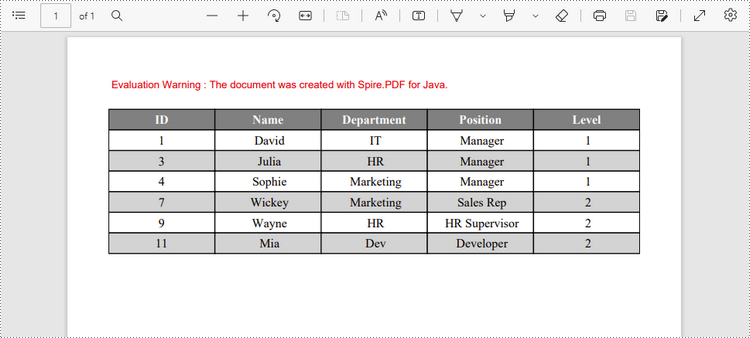
Create a Table in PDF Using PdfGrid Class
Below are the steps to create a table in PDF using the PdfGrid class using Spire.PDF for Java.
- Create a PdfDocument object.
- Add a page to it using PdfDocument.getPages().add() method.
- Create a PdfGrid object.
- Set the table style using the methods under the PdfGridStyle object which is returned by PdfGrid.getStyle() method.
- Add rows and columns to the table using PdfGrid.getRows().add() method and PdfGrid.getColumns().add() method.
- Insert data to specific cells using PdfGridCell.setValue() method.
- Span cells across columns or rows using PdfGridCell.setRowSpan() method or PdfGridCell.setColumnSpan() method.
- Set the formatting of a specific cell using PdfGridCell.setStringFormat() method and the methods under PdfGridCellStyle object.
- Draw table on the PDF page using PdfGrid.draw() method.
- Save the document to a PDF file using PdfDocument.saveToFile() method.
- Java
import com.spire.pdf.*;
import com.spire.pdf.graphics.*;
import com.spire.pdf.grid.PdfGrid;
import com.spire.pdf.grid.PdfGridRow;
import java.awt.*;
import java.awt.geom.Point2D;
public class CreateGrid {
public static void main(String[] args) {
//Create a PdfDocument object
PdfDocument doc = new PdfDocument();
//Add a page
PdfPageBase page = doc.getPages().add(PdfPageSize.A4,new PdfMargins(40));
//Create a PdfGrid
PdfGrid grid = new PdfGrid();
//Set cell padding
grid.getStyle().setCellPadding(new PdfPaddings(1, 1, 1, 1));
//Set font
grid.getStyle().setFont(new PdfTrueTypeFont(new Font("Times New Roman", Font.PLAIN, 13), true));
//Add rows and columns
PdfGridRow row1 = grid.getRows().add();
PdfGridRow row2 = grid.getRows().add();
PdfGridRow row3 = grid.getRows().add();
PdfGridRow row4 = grid.getRows().add();
grid.getColumns().add(4);
//Set column width
for (int i = 0; i < grid.getColumns().getCount(); i++) {
grid.getColumns().get(i).setWidth(120);
}
//Write data into specific cells
row1.getCells().get(0).setValue("Order and Payment Status");
row2.getCells().get(0).setValue("Order number");
row2.getCells().get(1).setValue("Date");
row2.getCells().get(2).setValue ("Customer");
row2.getCells().get(3).setValue("Paid or not");
row3.getCells().get(0).setValue("00223");
row3.getCells().get(1).setValue("2022/06/02");
row3.getCells().get(2).setValue("Brick Lane Realty");
row3.getCells().get(3).setValue("Yes");
row4.getCells().get(0).setValue("00224");
row4.getCells().get(1).setValue("2022/06/03");
row4.getCells().get(3).setValue("No");
//Span cell across columns
row1.getCells().get(0).setColumnSpan(4);
//Span cell across rows
row3.getCells().get(2).setRowSpan(2);
//Set text alignment of specific cells
row1.getCells().get(0).setStringFormat(new PdfStringFormat(PdfTextAlignment.Center));
row3.getCells().get(2).setStringFormat(new PdfStringFormat(PdfTextAlignment.Left, PdfVerticalAlignment.Middle));
//Set background color of specific cells
row1.getCells().get(0).getStyle().setBackgroundBrush(PdfBrushes.getOrange());
row4.getCells().get(3).getStyle().setBackgroundBrush(PdfBrushes.getLightGray());
//Format cell border
PdfBorders borders = new PdfBorders();
borders.setAll(new PdfPen(new PdfRGBColor(Color.ORANGE), 0.8f));
for (int i = 0; i < grid.getRows().getCapacity(); i++) {
PdfGridRow gridRow = grid.getRows().get(i);
gridRow.setHeight(20f);
for (int j = 0; j < gridRow.getCells().getCount(); j++) {
gridRow.getCells().get(j).getStyle().setBorders(borders);
}
}
//Draw table on the page
grid.draw(page, new Point2D.Float(0, 30));
//Save the document to a PDF file
doc.saveToFile("output/PdfGrid.pdf");
}
}
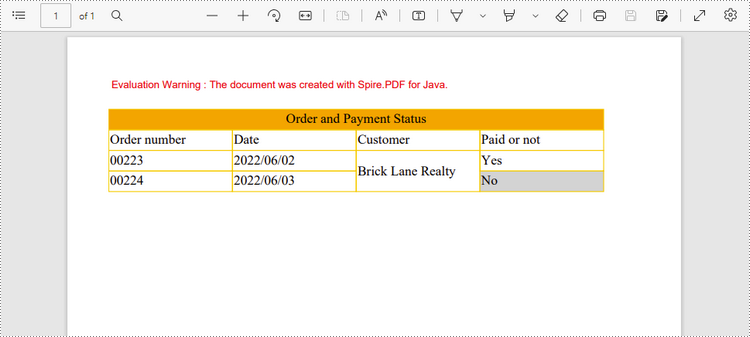
Apply for a Temporary License
If you'd like to remove the evaluation message from the generated documents, or to get rid of the function limitations, please request a 30-day trial license for yourself.
